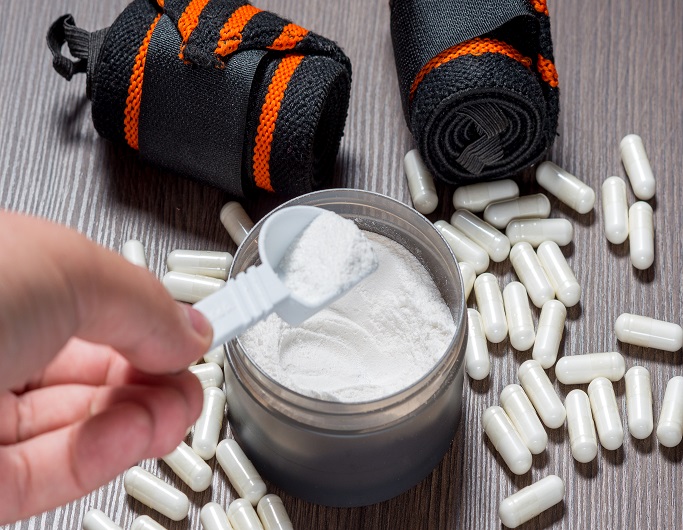Studies show to fuel the perfect gym session your pre workout shake needs to contain certain ingredients that will support endurance, increase strength and boost speed. Our Sports Scientist Ross Edgley looks at the specialist supplements you can put in your pre workout shake to fuel, quite possibly, your best workout ever.
Protein and Essential Amino Acids
Of course, no meal is complete without protein, as the building block of new muscle growth; protein is vital to maintaining a positive nitrogen balance necessary to stimulate maximum protein synthesis and increase muscle. But more importantly, a study conducted at the Medical Branch at the University of Texas discovered that protein synthesis was increased when Essential Amino Acids were taken ‘immediately before resistance exercise.’ (K. Tipton et al 2001) So try adding 25-35 grams of a good whey protein and 5 grams of Essential Amino Acids to form the basis of your pre workout shake.
Instant Oats
Before hitting the gym your shake needs to have some form of carbohydrates in there to fuel your workout, in fact research at the Exercise Physiology Laboratory at Ohio State University in Columbus showed that taking between ‘1.1 and 1.5 grams of liquid carbohydrate per kg of body mass, 60 minutes before exercise greatly improved athletic performance.’ (WM Sherman et al 1991.) Ideally these should be Low GI carbs like instant oats (Glycemic Index, 45-10) to ensure your body receives a steady release of energy throughout the gym session.
Caffeine
Researchers at Yale University found that as little as 200 milligrams of caffeine before a workout can increase strength endurance. Experts believe it stimulates the production of the neuro transmitter beta-endorphin, which studies show can reduce pain and perceived fatigue, which can then in turn increase your strength endurance. So try adding a very, very small teaspoon of this to your pre workout shake mix.
Beta Alanine
Next try adding 2 grams of the non-essential amino acid beta alanine in your shake, since studies shown it can increase the concentration of Carnosine in muscles which in turn can enable your muscles to work harder for longer whilst also preventing lactic acid build up during intense exercise, therefore reducing fatigue. One study in particular at the Department of Exercise Science and Health Promotion at Florida Atlantic University found that taking beta alanine before training enhanced endurance performance.
Creatine
The subject of hundreds of studies, Creatine Monohydrate has been proven to help improve power, strength, muscle growth and reduce recovery time between intense bouts of exercise. More specifically, a study conducted at the Exercise & Sport Sciences Laboratory at The University of Memphis discovered that creatine supplementation before training promoted significantly ‘greater gains in fat/bone-free mass, upper extremity lifting volume, and sprint performance during resistance/agility training in well-trained collegiate football players.’
L Arginine
The fifth and final specialist ingredient in your pre workout shake is something a bit different, the conditionally essential amino L Arginine. Experts have found it to have a number of roles in human biochemistry like improving endurance, and reducing recovery but specifically for pre workout shakes, it can help to increase nitrogen oxide which is responsible for increasing the flow of blood and nutrients to the muscles, also known as the ‘pump.’ The results of a study carried out at the City of Hope National Medical Center, in Duarte, California found that nitric oxide before training greatly helps with the transport of glucose to the muscles during exercise. So trying adding 2 grams of L Arginine as the final ingredient in your pre workout shake.
References:
- Kevin D. Tipton, Blake B. Rasmussen, Sharon L. Miller, Steven E. Wolf, Sharla K. Owens-Stovall, Bart E. Petrini, and Robert R. Wolfe (2001) ‘Timing of amino acid-carbohydrate ingestion alters anabolic response of muscle to resistance exercise’ American Journal of Physiology
- Boirie, Y., et al., “Slow and Fast Dietary Proteins Differently Modulate Post-Prandial Protein Accretion,” Proc Natl Acad Sci 94 (1997) : 14930-5.
- Dangin, M., et al., “The Digestion Rate of Protein Is an Independent Regulating Factor of Post-Prandial Protein Retention,” Am J Physiol (Endocrinology & Metabolism) 280.2 (2001) : E340 -8.
- Gambelunghe, C., et al., “Physical Exercise Intensity Can Be Related to Plasma Glutathione Levels,” J Physiol Biochem 57.2 (1997) : 9-14.
- Kerksick, C., et al., “Effects of Whey Protein Supplementation with Casein or BCAA & Glutamine on Training Adaptations II: Performance,” Med Sci Sport Exer 35.5 (2003) : abstract 2204.
- Kreider, R., et al., “Effects of Whey Protein Supplementation with Casein or BCAA & Glutamine on Training Adaptations I: Body Composition,” Med Sci Sport Exer 35.5 (2003) : abstract 2205.
- Leeuwenburgh, C., and Li, L.L., “Glutathione Depletion in Rested and Exercised Mice: Biochemical Consequences and Adaptation,” Arch Biochem Biophys 316.22 (1995) : 941-9.
- Leeuwenburgh, C., and Li, L.L., “Glutathione and Glutathione Ester Supplementation of Mice Alter Glutathione Homeostasis During Exercise,” J Nutr 128.12 (1998) : 2420-6.
- Lemon, P.W.R., et al., “Protein Requirements and Muscle Mass/Strength Changes During Intensive Training in Novice Bodybuilders,” J Appl Physiol 73 (1992) : 767-7.
- Lemon, P.W.R., “Effects of Exercise on Protein Metabolism. In Nutrition in Sport (Maughan, R.J. [ed.], Blackwell Science Ltd., 1257-65) 2000.
- Sen, CK., et al., “Exercise-Induced Oxidative Stress: Glutathione Supplementation and Deficiency,” J Appl Physiol 77.5 (1994) : 2177-87.
- Svensson, M.B., “Endogenous Antioxidants in Human Skeletal Muscle and Adaptation of Energy Metabolism: With Reference to Exercise—Training, Exercise Factors and Nutrition,” Ph.D. Thesis, Karolinska Institute, Sweden, 2003.
- Tarnopolsky, M.A., et al., “Evaluation of Protein Requirements for Strength Trained Athletes,” J Appl Physiol 73 (1992) : 1986-95.
- Ziemlanski, S., et al., “Balanced Intraintestinal Nutrition: Digestion, Absorption and Biological Value of Selected Preparations of Milk Proteins,” Acta Physiol Pol 29.6 (1978) : 543-56.
- Yves Boirie, Martial Dangin, Pierre Gachon, Marie-Paule Vasson, Jean-Louis Maubois, and Bernard Beaufrere (1997) ‘Slow and fast dietary proteins differently modulate postprandial protein accretion’
- Philip Newsholme (2001) ‘Why Is L-Glutamine Metabolism Important to Cells of the Immune System in Health, Postinjury, Surgery or Infection?’ The American Society for Nutritional Sciences












No Comments yet!